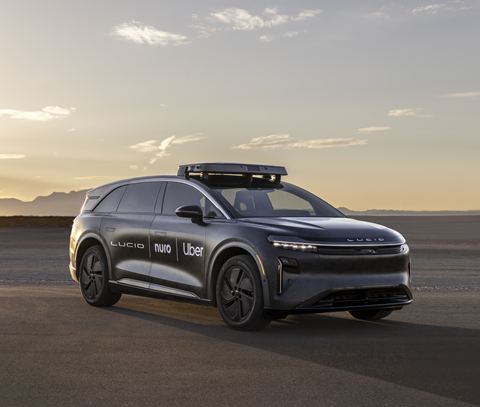On July 17, mobility service platform Uber announced a partnership with electric vehicle manufacturer Lucid and autonomous driving startup Nuro to launch an autonomous taxi fleet. Uber stated that the company or its third-party partners will purchase and operate Lucid Gravity vehicles equipped with Nuro Driver technology, integrating these vehicles into its global mobility network. The first such vehicles are planned to launch in late 2026 in a major U.S. city, although the specific city has not been disclosed. Additionally, the company plans to deploy at least 20,000 Lucid Gravity autonomous taxis within six years. Prototypes of the autonomous taxis developed jointly by Lucid and Nuro are already in operation at Nuro's closed testing ground in Las Vegas. At the same time, Uber announced investments of several hundred million dollars in both Lucid and Nuro, with Lucid set to receive $300 million, part of which will be used to upgrade its production line to integrate Nuro's hardware into the Gravity model. Lucid also announced plans for a 1-for-10 reverse stock split, pending shareholder approval. Uber's recent large-scale collaborations and investments further highlight its strategic shift: moving away from developing autonomous driving technology in-house and opting to partner with and invest in specialized autonomous technology companies. CEO Dara Khosrowshahi has mentioned that the company has liquidated part of its stake in autonomous freight company Aurora to fund future investments in the driverless ecosystem. The competition in the nascent autonomous taxi market is intensifying, with electric vehicle giant Tesla launching its long-promised autonomous taxi service in Austin last month and CEO Elon Musk committing to expand this service to other cities. Uber first collaborated with Nuro in 2022 on a food delivery robot project, and the following year, Nuro shifted from developing customized autonomous vehicles to focusing on autonomous driving software. For Lucid, the partnership with Uber represents a significant client, as the company has been working to boost its production and delivery numbers, expecting to produce 20,000 vehicles in 2025, more than double its output from the previous year. Lucid has also been developing advanced driving systems and announced earlier this year a partnership with King Abdullah University of Science and Technology in Saudi Arabia. The company stated it still plans to continue developing its own autonomous driving and driver-assistance technologies.
Uber Partners with Lucid and Nuro to Launch Autonomous Taxi Fleet

Share this post on: